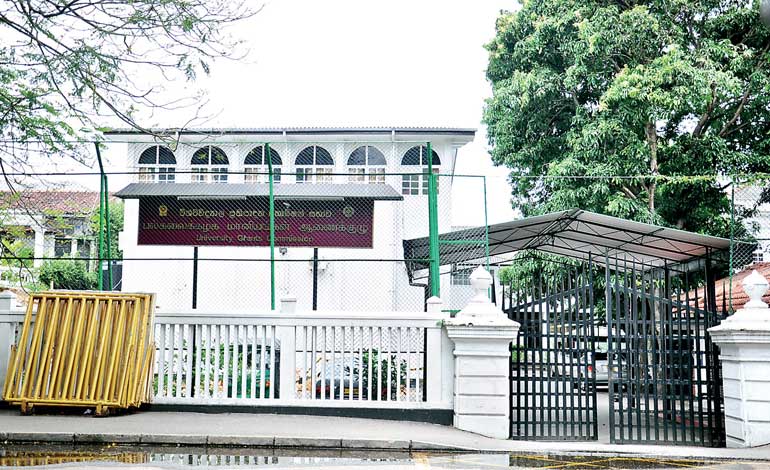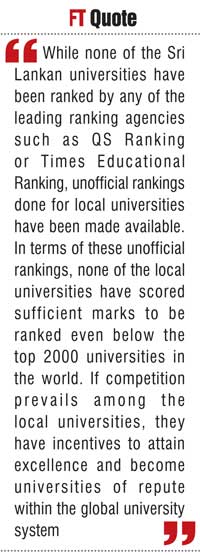Friday Feb 20, 2026
Friday Feb 20, 2026
Monday, 29 June 2015 00:05 - - {{hitsCtrl.values.hits}}

What the University Grants Commission has done so far is not to promote competition among universities. It has developed a system where all universities have become uniform institutions – Pic by Sameera Wijesinghe
Passing the responsibility onto masters
‘Rendering unto Caesar’ has been the title of the acclaimed autobiography of the top civil servant Bradman Weerakoon who had served nine Prime Ministers during his long career. The message delivered by the title is that the bureaucracy which wields so much of administrative powers has a tendency to pass the responsibility for all mishaps unto Caesar, a collective title used for their political masters.
The political masters too have created a situation to get the full blame by openly displaying their mastery on everything, including the adverse changes in or the oncoming of favourable weather. Thus, at elections, politicians change but the bureaucracy continues just like in ancient Rome, Caesar had been gone but Rome had continued at least for some time.
But it kills the creativity of public servants devoid of challenges
But the effect is devastating for the bureaucrats personally and for the nation as a whole. Bureaucrats lose their creative skills but develop only cunningness as to how they could survive and prosper amid a gang of politicians who take control of everything from rains to high economic planning.
The nation loses because, devoid of creative workers, it would not plan properly for its future prosperity. The inevitable outcome would be a nation that would move backward day by day. This is what has happened to Sri Lanka’s once much-praised administrative service and to the nation as a whole.
Caesar at the university system
A classic example of the repeat of rendering unto Caesar has taken place in the current university system in Sri Lanka.
A single university with different campuses killed university systems creativity
During the reign of Sirimavo Bandaranaike from 1970 to 1977, all the universities in Sri Lanka were integrated into a single university called the University of Ceylon converting the individual universities which had functioned independently previously into different  campuses under this integrated university. This important change to the country’s university system was made consequent on a recommendation made by special committee appointed by the government under the chairmanship of a reputed academic and leftist politician, Osmond Jayarathne.
campuses under this integrated university. This important change to the country’s university system was made consequent on a recommendation made by special committee appointed by the government under the chairmanship of a reputed academic and leftist politician, Osmond Jayarathne.
The Osmond Jayarathne Committee had argued that for a small country like Sri Lanka, it was not economical to have a number of universities because they tended to duplicate courses and degree programmes. Hence, in order to manage the scarce resources of the country properly, it was suggested to have a single university at the centre and all other universities to function under that single university as campuses.
This move by the Government was contrary to what it had promised at the elections in 1970. Criticising the previous system in which it was alleged that the autonomy of universities had been destroyed by the National Council of Higher Education, the Government had promised to restore autonomy to universities by having a university grants commission at the centre for the sole purpose of allocating funds to State universities. But what was done was a complete reversal in which a centralised university was imposed on all the universities taking away even the prevailing autonomy which they had enjoyed for decades.
It killed the creativity of the university system since all decisions relating to universities were taken at the centre by a group of people attached to the integrated university.
The need for restoring university autonomy
Hence, the need when the new Government came to power in 1977 was to fully restore the academic and administrative autonomy to the country’s university system. Wimal G Balagalle, a Professor of Sinhalese at the then Vidyodaya Campus of the University of Ceylon, has described the desired change in an article written in Sinhala and titled ‘A Sketch of the History of the University of Sri Jayewardenepura’ published in the Journal Vidyodaya in 1984 as follows: “One of the promises in the election manifesto of UNP that came to power in 1977 under J.R. Jayewardene’s leadership was to restore the lost autonomy to universities in Sri Lanka.”
Accordingly, the Universities Act No. 16 of 1978 was enacted in Parliament and was implemented as from 1 January 1979 reconverting the previous campuses in to independent universities under an umbrella organisation called the Universities Grants Commission, abbreviated as UGC.
UGC system functioned well in the first few years
During the first few years the Universities Act was effective, the newly established universities had enjoyed considerable autonomy in their operations as claimed by Balagalle.
Says Balagalle: “During the first few years under the University Grants Commission, the environment within the university was a favourable one. Student discipline improved considerably. During this period, a serious student dispute arose only on one occasion (at the University of Sri Jayewardenepura). The lethargy which had overwhelmed the majority of university teachers previously began to disappear gradually (....) The Convocations which had been abandoned were restarted and held annually building reputation about the university in the country (....) This was also a favourable era regarding the capital developments within the university”.
UGC acquiring more powers and becoming a bureaucratic head
However, this situation has changed from better to worse in the subsequent periods with a number of amendments to the Universities Act giving more and more powers to UGC. Since UGC was effectively under political control, it was indeed an empowerment of the country’s political machinery with respect to the country’s university education.
When the universities had given up their autonomy voluntarily, UGC and the political machinery above it had captured the universities and the higher education system in the country. By now, universities have become glorified Technical Colleges functioning under the direction of educational authorities with no freedom to do what they should do.
By statute, the Council is the supreme authority of a university
In terms of the Universities Act, the supreme authority of a university is its Council chaired by the Vice Chancellor. From the academic side, it is composed of the Vice Chancellor, Deputy Vice Chancellor, Rector, Deans of Faculties, and two representatives of the Senate. The Council should have members appointed by UGC from outside to form a majority because, in terms of the Act, they should have a number increased by one over the academic members.
The Act says that they should be from “among persons who have rendered distinguished service in educational, professional, commercial, industrial, scientific or administrative spheres” Hence, the objective enshrined in the Act has been to appoint a Council composed of people of worth to give effective leadership to a university. But, for the Council to serve this purpose, it should have powers to act as the real authority of a university.
The Council has all the powers in theory
In fact, in terms of the Universities Act, the Council has all powers to do its job. Those powers are extended to all areas of operations of a university, from administration to finance to academic. It has powers to make By-Laws and Regulations. The only limitation is that, in respect of By-Laws, they should be for matters it has been authorised under the Act and in respect of regulations, those that have not been made by any other authority in a university.
The matters authorised under the Act which have enabled the Council to make By-Laws cover all the administrative, financial and academic areas of a university. However, on academic matters, its decisions should first be referred to the Senate, the academic authority of a university, for its views and opinion. Yet, the final decision with respect to even academic matters rests with the Council.

The Minister has powers only to communicate written directions on national policy
The Minister in charge of higher education has been given powers under the Act to issue general written directions to UGC conveying it the national policy on higher education. Once these directions are issued, it is the responsibility of UGC to implement them.
These powers have been given to the Minister not to interfere in the day to day operations of a university but to direct all of them in line with the national policy on higher education. A minister cannot use these powers arbitrarily. They should necessarily be to bring in national policy into the higher education field. As such, there are several safeguards provided in the Act to prevent the Minister from abusing these powers.
Safeguards to prevent the abuse of ministerial powers
First, these directions should be in writing so that they are fully disclosed, transparent and on record. Thus, a Minister cannot deny having issued them later. Second, they should be general instructions and not specific to any matter concerning a university. Third, all these directions should be tabled in Parliament as soon as possible so that they become documents available in public domain. It also gives an opportunity for the Parliamentarians to debate on the appropriateness or suitability of the directions issued by the Minister.
Hence, the Minister of higher education in Sri Lanka is not someone acts secretively but openly to facilitate full public disclosure of what he does. It is important for UGC and the university Councils to take not of this role of the political authorities as provided for by legislations. Any deviation from such open practice required of a Minister should not be obliged by those who run UGC or universities.
Competition among universities a must to promote excellence
But in practice, what is happening is completely contrary to the provisions in the Universities Act. If the Government is interested in building a vibrant and dynamic university system, it should necessarily promote competition among different universities in the country. Competition leads to excellence and excellence leads to building universities of high repute. This is observable in the case of the global ranking of the Sri Lankan universities.
While none of the Sri Lankan universities have been ranked by any of the leading ranking agencies such as QS Ranking or Times Educational Ranking, unofficial rankings done for local universities have been made available. In terms of these unofficial rankings, none of the local universities have scored sufficient marks to be ranked even below the top 2000 universities in the world. If competition prevails among the local universities, they have incentives to attain excellence and become universities of repute within the global university system.
UGC has killed competition and instead built uniform universities
What UGC has done so far is not to promote competition among universities. It has developed a system where all universities have become uniform institutions. They are governed by a uniform remuneration system, uniform career advancement and promotion system, uniform disciplinary management system and uniform recruitment system. This has adversely affected the ability of universities to recruit and retain top quality academics or top quality administrators.
A Vice Chancellor of a university has to manage a staff of more than 4000 members and 10,000 students. He is also required to plan for the future development of a university. Yet, the remuneration of vice chancellors has been fixed uniformly at the salary level of a senior university professor which is lower than a middle level executive of a State bank.
With that type of remuneration, it is unlikely that a university would be able to recruit a person of high repute and calibre to hold that extremely responsible position. Hence, it is only the junior academics like senior lecturers who have all the incentives to apply for the post of vice chancellor. By paying unattractive salaries to academic staff on a uniform basis, incentives have been built within the system for highly qualified academics to leave universities seeking for greener pastures elsewhere.
Universities are like branch offices of a state bank
University councils have no freedom to decide on the salaries of the academic or non-academic staff. They have to be guided by the uniform systems introduced by UGC. Hence, the current universities in Sri Lanka are not separate independent institutions. They are like the branches of a state bank where the branch manager looks up to the head office for guidance on every matter pertaining to his branch.
In the same way, the university councils, university vice chancellors, university administrators and even university academics look up to UGC for guidance on every minor and trivial matter. In the process, they have become obedient followers. But at the same time, they have lost even the commonsense and creativity of doing something productively. This is a serious situation facing the universities in Sri Lanka.
Recruitment of staff on political nominations
A worse development that has happened in the recent past has been the inability of universities to recruit clerical and minor grade staff. It is known that the universities have been issued with a list of names recommended by the political authority of the university system for such recruitment.
One may justify this nomination system as a system that has made the recruitment easier and less costly. That is because, given the high unemployment level among the educated categories, if a university is to advertise these posts, the chances are that it would get flooded by applications. Hence, the nominations made by the political authority make the life of university administrators less cumbersome. But, the danger is that these nominated workers have a godfather looking after them outside the university and as a result, the university administrators find it difficult to administer disciplinary control over them.
Lame duck councils to waste time on even minor disciplinary matters
There is no delegation of authority in the university system and as a result, every minor issue at the university is brought before the Council for guidance or for approval. For instance, if a minor employee has stolen a broom stick, even to call for explanation from the employee in question, the approval of the Council is sought. Thus, the administrative staffs render it unto the Council.
At the Council, the members, instead of using commonsense, look for guidance from UGC. Accordingly, the Council members render it unto the UGC. The result is that no one in the system wants to make decisions and take responsibility for such decisions. The wide practice of this ‘responsibility passing game’ has killed the creativity within the university systems. This is indeed a pathetic state to which universities have descended. It needs quick fixing, if the university system is to survive in Sri Lanka.
(W.A. Wijewardena, a former Deputy Governor of the Central Bank of Sri Lanka, can be reached at [email protected].)